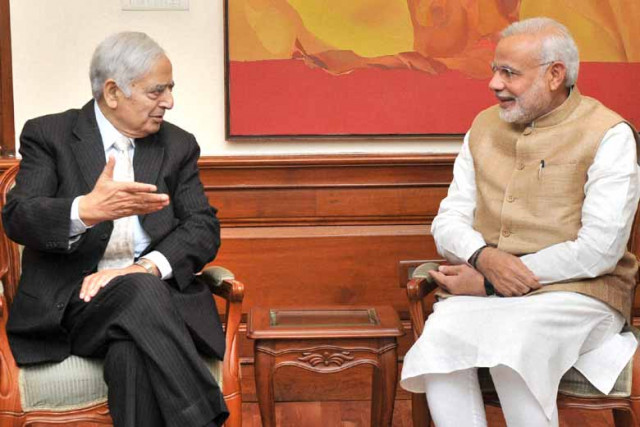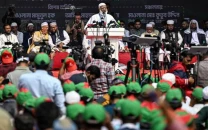India's ruling Hindu party forms coalition in mainly Muslim Kashmir
PDP leader Mufti Mohammad Sayeed will be chief minister of the region and head of its coalition government

PHOTO: PRESS TRUST OF INDIA
Indian Prime Minister Narendra Modi's Bharatiya Janata Party (BJP) and the Peoples Democratic Party (PDP) have forged a coalition government after inconclusive elections two months ago for the restive Himalayan region's state assembly.
Read: India's Modi meets incoming Kashmir leader after deal
Mufti Mohammad Sayeed, the Muslim head of the PDP, was sworn in as chief minister of the region, where a sporadic revolt against Indian rule has been waged since 1989. In a symbolic gesture he enthusiastically embraced Modi, who was on stage to witness the historic ceremony.
"This is a great day. No one in their wildest dreams ever thought of this," PDP leader Naeem Akhtar said after the ceremony in the region's winter capital of Jammu.
"But I think Mufti Sayeed and the national (BJP) leadership of Modi-ji, they are on a journey to turn around Kashmir," an upbeat Akhtar told the NDTV network, using a Hindi honorific for respect.
The inauguration, held amid tight security at the University of Jammu, came after weeks of intense negotiations between the two parties which disagree on several critical issues in the region.
Read: Kashmir issue to be discussed with Indian foreign secretary: FO
Sayeed has described the alliance as the "coming together of the North Pole and the South Pole" while the BJP has hailed the move as a "miracle of democracy".
The negotiations followed December elections that saw the BJP capture 25 seats mainly in the Hindu-dominated Jammu region, while the PDP took 28, mostly in the Kashmir valley where Muslim separatist sentiment has traditionally been strongest.
But both failed to secure a majority to the 87-seat assembly, forcing the negotiations.
Both parties benefited at the polls from widespread discontent at the state's then-ruling National Conference party, over its handling of floods that killed more than 200 people in Kashmir in September.
Read: My government has only one religion, India first: Modi
The polls were marred by a number of deadly attacks in the region, which is divided between India and Pakistan and claimed by both.
Swarms of police patrolled the university grounds before the ceremony, which was also attended by BJP president Amit Shah.
"We have taken all necessary measures along the border (with Pakistan) and in the city to maintain law and order," police inspector-general for the Jammu region, Rajesh Kumar, told AFP.
Modi and Sayeed last week finally agreed on a common agenda to jointly rule the state and details were expected to be unveiled at a press conference later on Sunday.
But the agenda is unlikely to include any reference to scrapping a constitutional provision which allows Kashmir to make its own laws, even though the BJP has long been committed to its abolition.
Read: Show of support: ‘Our position on Kashmir dispute will not change’
The BJP has also traditionally baulked at demands by the PDP to scrap a draconian law that gives Indian forces sweeping search and shoot-on-sight powers in Kashmir, which is seen by critics as a cover for rights abuses.
Analysts warned that the coming together of two ideologically different parties could fuel discontent among Hindus in Jammu as well as Muslims in the Kashmir valley.
"A big challenge will be to shore up credibility among voters in both regions of the state," said Siddiq Wahid, a columnist and historian.
"What direction the discontent will take will depend on whether civil rights, like holding peaceful protest marches, will again be curbed."
The PDP had pledged during the election campaign to halt the BJP's growing influence after Modi swept to power at general polls in May.
The new coalition government faces the tough challenge of rebuilding after the floods that destroyed $16 billion worth of property and infrastructure.



















COMMENTS
Comments are moderated and generally will be posted if they are on-topic and not abusive.
For more information, please see our Comments FAQ